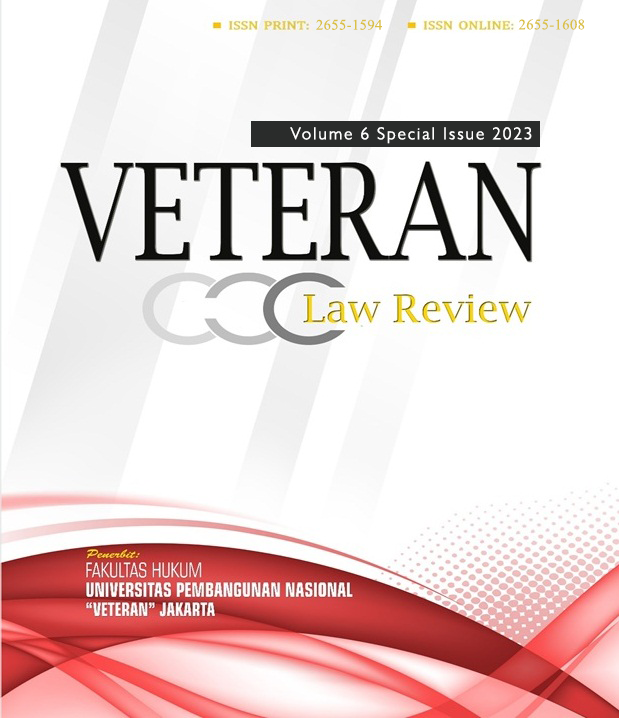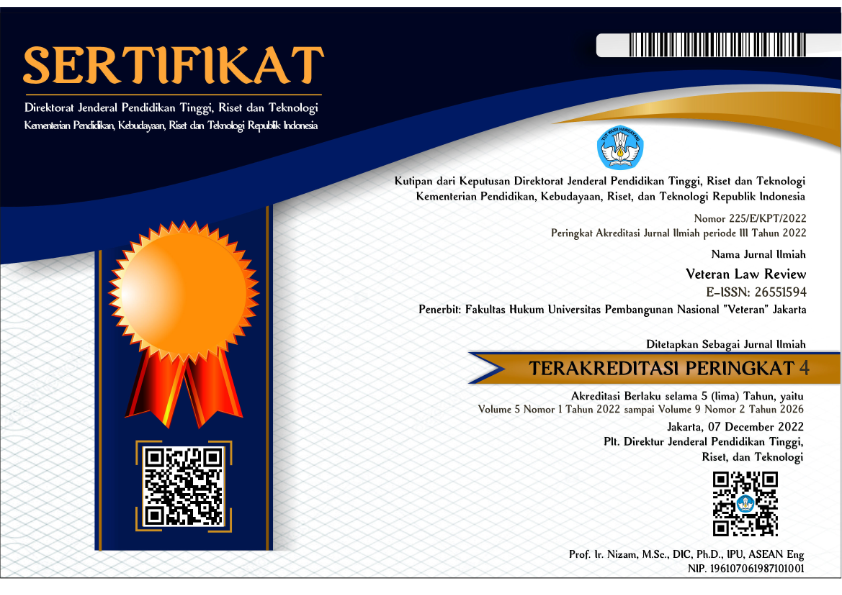The Simultaneous Vacancy of the Definitive Regent and Vice Regent Positions in Muara Enim and Ogan Komering Ulu
DOI:
https://doi.org/10.35586/velrev.v6iSpecialIssues.5834Keywords:
Regional Head; Law; Appointment Process.Abstract
The condition of a vacancy in the Head of the Region position in a problem that occurred in Muara Enim and Ogan Komering Ulu becomes a unique issue in filling the position because the vacancy happened simultaneously in both the Regent and Vice Regent positions. Currently, in Muara Enim, the position is filled by an Acting Regent (Plt) who was appointed by the Regional People's Representative Council (DPRD) after the Vice Regent's election. However, there is currently a legal challenge in the State Administrative Court (PTUN) regarding the DPRD's appointment decision. For Ogan Komering Ulu Regency, the elected Regent and Vice Regent from the 2020 local elections, Kuryana Azis, passed away shortly after being inaugurated as Regent. Meanwhile, the Vice Regent, who had previously been a corruption defendant, was unable to perform his duties one day after the inauguration. Currently, the Governor has appointed the Head of the Department as the Acting Regent. However, Article 65 paragraphs (5) and (6) of the Local Government Law state that the Secretary of the Region (Sekda) should be the one to carry out the duties as the Acting Regent. "This research aims to provide an answer on the appointment process of the Regent and Vice Regent positions that are vacant simultaneously. This is because the Local Government Law and the Regional Head Election Law only regulate the vacancy of one position, either the Regent or Vice Regent. The method used in this research is a juridical-normative approach, with a combination of legislation analysis, case studies, and comparative approaches. The results of this research show that the appointment of a Substitute Regional Head follows the provisions of Law No. 23 of 2014, Law No. 10 of 2016, and Government Regulation No. 12 of 2018. The position of the Regional Head, Acting Regional Head, Acting Regent, Interim Regent, and Acting Officer is regulated under Law No. 23 of 2014, Law No. 30 of 2014, Law No. 10 of 2016, Government Regulation No. 49 of 2008, and Government Regulation No. 1 of 2018.
Downloads
References
A, Firdaun dan Fabian R. (2019). Pejabat Kepala Daerah, Ed. I . Cet. I, Yogyakarta: Thafa Media.
Arthanaya, I Wayan. (2011). Otonomi Dalam Penyelenggaraan Pemerintahan Daerah. Jurnal Kertha Wicaksana, 17(2).
Asshiddiqie, Jimly. (2009). Pengantar Ilmu Hukum Tata Negara. Jakarta: Rajawali Pers.
Efendi, A’an dan Freddy Poernomo. (2017). Hukum Administrasi, Jakarta: Sinar Grafika.
Fahririn. (2020). Komisi Pemberantasan Korupsi Wiretapping Authority After The Revision Of Law Number 19 Year 2019 Regarding The Corruption Eradication Commision. Jurnal Veteran Law Review, 3(2). 83.
Hadiwijoyo, Suryo Sakti. (2011). Gubernur Kedudukan, Peran dan Kewenangannya. Graha Ilmu, Yogyakarta.
Kaloh, J. (2009). Kepemimpinan Kepala Daerah : Pola Kegiatan, kekuasaan dan Perilaku Kepala Daerah dalam Pelaksanaan Otonomi Daerah. Jakarta: Sinar Grafika.
Manengkey, Mario Ferdinandus.(2015). Kewenangan Pejabat Sementara (Pjs) Gubernur Dalam Menetapkan Keputusan Tata Usaha Negara, Lex Administratum, Vol. III No. 6 Agustus 2015.
Marbun, Robinsar. (2020). Juridical Analysis Of Employee Considerations As Administrative Competition Agency. Jurnal Veteran Law Review, (3)1. 38.
Nurcholis, Hanif. (2007). Teori dan Praktik Pemerintahan dan Otonomi Daerah. Jakarta: Grasindo.
R, Fabian dan A Firdaun. (201). Pejabat Kepala Daerah, Ed. I. Cet I. Yogyakarta: Thafa Media.
Setiawan, Dian Bakti. (2011). Pemberhentian Kepala Daerah: Mekanisme Pemberhentiannya Menurut Sistem Pemerintahan di Indonesia. Jakarta: Raja Grafindo Persada.
Sihombing, Eka NAM dan Cynthia Hadita. (2022). Withdrawal Of Draft Regional Regulations By Regional Heads Before The Process Of Discussing The Draft Regional Regulations. Jurnal Veteran Law Review, 5(1). 58.
Sunggono, Bambang. Metode Penelitian Hukum. Jakarta: Raja Grafindo Persada.
Utrecht, E. (1997). Pengantar Hukum Administrasi Negara Indonesia, cetakan ke empat. Jakarta.
Undang- Undang Dasar Negara Republik Indonesia Tahun 1945.
Undang-Undang No 23 Tahun 2014 tentang Pemerintahan Daerah (JDIH) (Lembaran Negara Republik Indonesia Tahun 2014 Nomor 244, Tambahan Lembaran Negara Republik Indonesia Nomor 5587).
Undang-Undang No 9 Tahun 2015 tentang Perubahan Kedua atas Undang-Undang No 23 Tahun 2014 (Lembaran Negara Republik Indonesia Tahun 2015 Nomor 24, Tambahan Lembaran Negara Republik Indonesia Nomor 5657).
Undang-Undang No 10 Tahun 2016 tentang Perubahan Kedua Atas Undang-Undang Nomor 1 Tahun 2015 Tentang Penetapan Peraturan Pemerintah Pengganti Undang-Undang Nomor 1 Tahun 2014 Tentang Pemilihan Gubernur, Bupati, Dan Walikota Menjadi Undang-Undang (Lembaran Negara Republik Indonesia Tahun 2016 Nomor 130, Tambahan Lembaran Negara Republik Indonesia Nomor 5897).
Peraturan Pemerintah No 12 Tahun 2018 tentang Pedoman Penyusunan Tata Tertib Dewan Perwakilan Rakyat Daerah Provinsi, Kabupaten, dan Kota (Lembaran Negara Republik Indonesia Tahun 2018 Nomor 59, Tambahan Lembaran Negara Republik Indonesia Nomor 6197).
Downloads
Published
How to Cite
Issue
Section
License
Copyright (c) 2023 Veteran Law Review

This work is licensed under a Creative Commons Attribution-ShareAlike 4.0 International License.
Copyright (c) 2022 Veteran Law Review Journal
Veteran Law Review © 2022 by Faculty of Law Universitas Pembangunan Nasional "Veteran" Jakarta is licensed under Creative Commons Attribution 4.0 International

1. License
The non-commercial use of the article will be governed by the Creative Commons Attribution license as currently displayed on Creative Commons Attribution 4.0 International.
2. Author(s)' Warranties
The author warrants that the article is original, written by the stated author(s), has not been published before, contains no unlawful statements, does not infringe the rights of others, is subject to copyright that is vested exclusively in the author, and free of any third party rights, and that any necessary written permissions to quote from other sources have been obtained by the author(s).
3. User/Public Rights
VELREV's spirit is to disseminate articles published are as free as possible. Under the Creative Commons Attribution-ShareAlike 4.0 International License. VELREV permits users to copy, distribute, display, and perform the work for non-commercial purposes only. Users will also need to attribute authors and VELREV to distributing works in the journal and other media of publications.
4. Rights of Authors
Authors retain all their rights to the published works, such as (but not limited to) the following rights;
- Reproduce the work
- Prepare derivative works based upon the work
- Distribute copies of the work
- Perform the work publicly
- Display the work publicly
- Copyright and other proprietary rights relating to the article, such as patent rights,
- The right to self-archive the article,
- The right to enter into separate, additional contractual arrangements for the non-exclusive distribution of the article's published version (e.g., post it to an institutional repository or publish it in a book), with an acknowledgement of its initial publication in this journal (Veteran Law Review).
5. Co-Authorship
If the article was jointly prepared by more than one author, any author submitting the manuscript warrants that he/she has been authorized by all co-authors to be agreed on this copyright and license notice (agreement) on their behalf, and agrees to inform his/her co-authors of the terms of this policy. VELREV will not be held liable for anything that may arise due to the author's internal dispute. VELREV will only communicate with the corresponding author.
6. Royalties
Being an open accessed journal and disseminating articles for free under the Creative Commons license term mentioned, author(s) are aware that VELREV entitles the author(s) to no royalties or other fees.
7. Miscellaneous
VELREV will publish the article (or have it published) in the journal if the article’s editorial process is successfully completed. JOSI's editors may modify the article to a style of punctuation, spelling, capitalization, referencing, and usage that deems appropriate. The author acknowledges that the article may be published so that it will be publicly accessible and such access will be free of charge for the readers as mentioned in point 3.


















